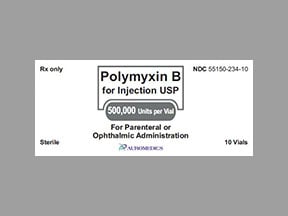
Polymyxin B Coupons & Savings Card – Discount Prices from $4.19
My prescription
Edit
500000UNIT, Polymyxin B (1 Solution Reconstituted)
Select pharmacy

CVS
$27.71
COUPON PRICE
Walmart
$4.19
COUPON PRICE
Albertsons
$9.56
COUPON PRICE
Walgreens
$13.48
COUPON PRICEPolymyxin B savings card
Show this card to your pharmacist
Walmart
$4.19
BIN
ID
PCN
GRP
019876
LHB473F8D9
CHIPPO
LHX
Powered by
More prescriptions for urinary tract infection
More prescriptions for urinary tract infection
Polymyxin B dosage forms
Dosage Quantity Price from Per unit 500000UNIT 1 Solution Reconstituted $4.19 $4.19 500000UNIT 10 Solution Reconstituteds $28.15 $2.81
| Dosage | Quantity | Price from | Per unit |
|---|---|---|---|
| 500000UNIT | 1 Solution Reconstituted | $4.19 | $4.19 |
| 500000UNIT | 10 Solution Reconstituteds | $28.15 | $2.81 |
Polymyxin B Warnings
Polymyxin B is an antibiotic used to treat serious infections caused by certain Gram-negative bacteria. While effective, its use carries specific risks that require careful consideration.
Kidney Damage (Nephrotoxicity): Polymyxin B can harm the kidneys, leading to conditions such as albuminuria (presence of albumin in urine), cylinduria (presence of cylindrical casts in urine), azotemia (elevated blood urea nitrogen), and, in severe cases, acute kidney failure. The risk increases with higher doses and prolonged use. Patients with existing kidney issues, older adults, and those with higher body mass index (BMI) are particularly susceptible. Regular monitoring of kidney function is essential during treatment.
Nerve Damage (Neurotoxicity): This medication may affect the nervous system, causing symptoms like dizziness, numbness, tingling sensations, slurred speech, and, in severe instances, respiratory paralysis. These effects are more common in individuals with impaired kidney function or when polymyxin B is used alongside other neurotoxic drugs. If neurological symptoms occur, discontinuing the drug and seeking immediate medical attention is crucial.
Severe Allergic Reactions: Some individuals may experience serious allergic responses, including anaphylaxis, which is a life-threatening condition. Signs include difficulty breathing, swelling of the face or throat, and hives. Patients with known allergies to polymyxins or related antibiotics should avoid using polymyxin B.
Respiratory Issues: Polymyxin B can cause respiratory problems, especially when administered by inhalation. Symptoms may include bronchoconstriction (narrowing of the airways) and apnea (temporary cessation of breathing). Patients with pre-existing respiratory conditions should use this medication with caution.
Gastrointestinal Complications: The use of polymyxin B has been associated with Clostridium difficile-associated disease (CDAD), a severe intestinal condition that can range from mild diarrhea to life-threatening colitis. Symptoms may appear during or after treatment and require prompt medical evaluation.
Use in Specific Populations: The safety of polymyxin B during pregnancy has not been established, so it should only be used if the potential benefits outweigh the risks. Breastfeeding mothers should consult their healthcare provider before using this medication. In pediatric patients, especially those under two years of age, safety and efficacy have not been well established, necessitating cautious use.
Given these risks, polymyxin B should be prescribed and administered under strict medical supervision, with regular monitoring for any adverse effects.
Polymyxin B Side Effects
Polymyxin B is an antibiotic used to treat various bacterial infections. While effective, it can cause several side effects, some of which may require medical attention. Common Side Effects:
- Injection Site Reactions: Pain, redness, or swelling at the injection site are common.
- Gastrointestinal Issues: Nausea, vomiting, and diarrhea may occur.
- Neurological Symptoms: Dizziness, drowsiness, headache, and numbness or tingling in the hands or feet have been reported.
Serious Side Effects:
- Kidney Problems (Nephrotoxicity): Signs include decreased urine output, swelling in the lower back or side, and elevated blood urea nitrogen (BUN) and serum creatinine levels.
- Nerve Damage (Neurotoxicity): Symptoms may involve muscle weakness, unsteady walking, blurred vision, and, in severe cases, respiratory distress.
- Allergic Reactions: Rash, itching, swelling (especially of the face, tongue, or throat), severe dizziness, and difficulty breathing require immediate medical attention.
Other Considerations:
- Diarrhea: Polymyxin B may cause diarrhea, which can be severe and occur even two months or more after stopping the medication. Do not take any medicine to treat diarrhea without first checking with your doctor.
- Drug Interactions: Concurrent use with other nephrotoxic or neurotoxic drugs, such as aminoglycosides or certain diuretics, can increase the risk of side effects.
Monitoring and Precautions:
- Kidney Function: Regular monitoring of kidney function is essential during treatment.
- Neurological Assessment: Be vigilant for signs of nerve damage, especially in patients with pre-existing conditions.
- Hydration: Maintaining adequate hydration can help reduce the risk of kidney damage.If you experience any severe or concerning side effects while taking Polymyxin B, contact your healthcare provider immediately.
Polymyxin B Interactions
When using polymyxin B, it's important to be aware of potential interactions with other medications, as these can increase the risk of side effects, particularly affecting the kidneys and nervous system. Combining polymyxin B with other drugs that have similar toxic effects should generally be avoided unless specifically directed by a healthcare provider. Such drugs include:
Aminoglycoside antibiotics: Medications like Amikacin, gentamicin, and Tobramycin can enhance the risk of kidney damage when used with polymyxin B.
Neuromuscular blocking agents: Drugs such as atracurium, pancuronium, and vecuronium may intensify muscle weakness and respiratory issues when combined with polymyxin B.
Nonsteroidal anti-inflammatory drugs (NSAIDs): Medications like Ibuprofen and Naproxen can increase the likelihood of kidney problems when taken alongside polymyxin B.
Other nephrotoxic or neurotoxic drugs: This includes medications like Vancomycin and certain diuretics, which can compound the risks to kidney and nerve health.
If you're prescribed polymyxin B, it's crucial to inform your healthcare provider about all other medications you're currently taking, including over-the-counter drugs, supplements, and herbal products. This will help them assess potential interactions and adjust your treatment plan accordingly. Always follow your healthcare provider's instructions and do not discontinue or start any medications without their guidance.
